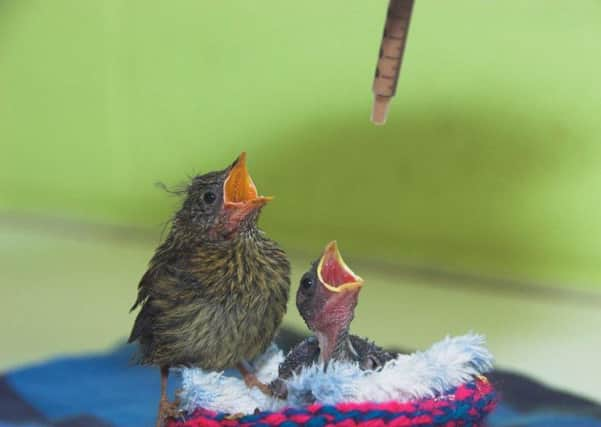Lorraine Gow: Don’t rush to help fledgings


Among the abundance of animals we rescued and rehabilitated at the National Wildlife Rescue Centre at Fishcross, near Alloa, last year, we cared for a record number of birds. More than 7,600 of the 9,861 animals admitted were birds.
Thousands of these were baby birds, or fledglings, who had been found out of their nest and unable to fly by concerned members of the public.
Advertisement
Hide AdAdvertisement
Hide AdIn early spring and summer our animal helpline received an average of around 140 calls a day regarding fledgling birds. This spike led to more than 420 baby birds arriving at the centre in the first half of 2018 alone.
A fledgling is a fully feathered young bird who is typically found out of the nest, learning to fly. Unless they are in harm’s way, these young birds are usually fine and actually developing important survival skills.
It is understandable for people to be worried when they come across a young bird on the ground which appears to be clumsy and unable to fly.
However, this is a rite of passage for fledglings and chances are their parents are nearby. Moving the young bird will not only separate it from and frighten away its mother, but it could put the bird in more danger.
That being said, there are instances when a baby bird does need our help. If a bird has fallen from a nest and has no feathers or if a fledgling has its eyes closed or is carrying obvious signs of injury, it needs assistance.
This is when our animal helpline will be able to advise on the situation and dispatch an animal rescue officer if necessary. They will then check the health of the bird and bring it to the centre if need be.
Members of the public who have discovered an injured fledgling, or one who has left the nest too soon, should contain it in a small box and keep it in a quiet area until we arrive to take it to our National Wildlife Rescue Centre for the expert care and rehabilitation necessary to wean the youngster and then release it back into the wild.
We will soon be relaunching our annual awareness campaign, #SSPCABabyBirds, to educate people on when a baby bird is in danger and needs our help and when it is best left alone.
Advertisement
Hide AdAdvertisement
Hide AdAs we enter into spring and the better weather approaches we are expecting another surge in demand for our services. As a charity with limited resources, we need the public’s support to make sure we are only helping animals who need it.
With spring comes the birth of many baby wild animals, as well as the awakening of many animals from hibernation, meaning many animals are at their most vulnerable. We would encourage the public to visit our website to find more information about wildlife and what they can do to help those in need.
Lorraine Gow is head of birds at the Scottish SPCA National Wildlife Rescue Centre.